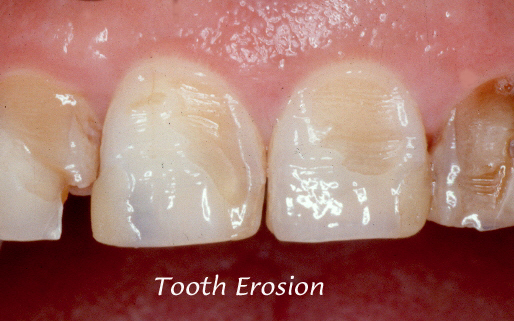What is Tooth Enamel Erosion?
Friday Mar 12th, 2021
Tooth enamel is the strongest substance in the human body. This semi-translucent, hard, outer layer of the teeth has an important job: protecting teeth from the daily wear and tear of biting and chewing, as well as temperature extremes from hot or cold foods and drinks. Enamel also guards teeth against the erosive effects of acids and chemicals.
Enamel covers the dentin, a part of the tooth that is not as dense as enamel. When enamel erodes, the dentin loses some of its protection. Then, the microscopic tubes inside the dentin allow hot, cold, or sweet foods to stimulate nerves within the tooth. As a result, you may notice that your teeth have become painfully sensitive to hot or cold foods and drinks and sweets.
Damaging Factors:
Many factors can contribute to tooth enamel loss:
- Drinking too many soft drinks or fruit drinks, along with poor dental hygiene. Bacteria thrive on sugar and produce high acid levels that can eat away at enamel.
Friction and wear and tear from brushing teeth too vigorously or grinding teeth can erode enamel.
- Eating lots of sour foods or candies. Acidic foods can erode tooth enamel.
- Dry mouth or low saliva volume. Saliva helps prevent decay by neutralizing acids and washing away leftover food in the mouth.
- Acid reflux disease (GERD), or heartburn. Acid reflux brings stomach acids up to the mouth, where the acids can erode enamel.
- Bulimia, alcoholism, or binge drinking, in which frequent vomiting exposes teeth to stomach acids.
- Certain drugs or supplements with high acid content, such as aspirin or vitamin C, can also erode enamel.
Symptoms:
When tooth enamel erodes, teeth are more vulnerable to cavities and decay, and they may lead to these symptoms:
-
- Sensitive teeth or tooth pain when eating hot, cold, or sweet foods or drinks
- Rough or irregular edges on the teeth, which can become cracked or chipped when enamel is lost
- Smooth, shiny surfaces on the teeth — enamel erosion causes mineral loss on these areas
- Yellowed teeth from thinned enamel
Cupping, or dents, that show up on the biting or chewing surfaces of the teeth




Post a comment